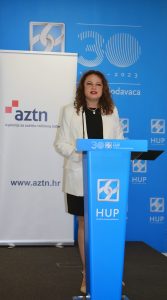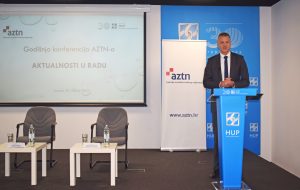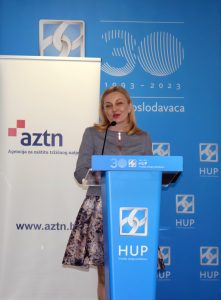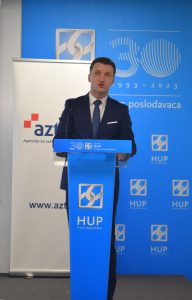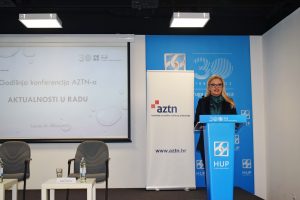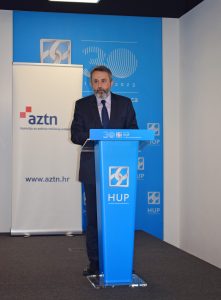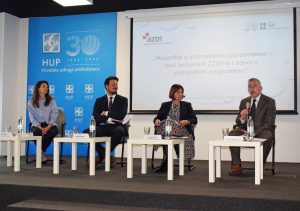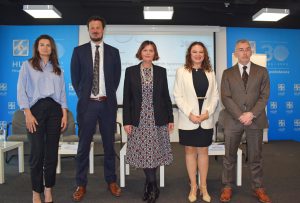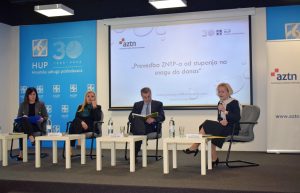Communication

The aim of the protection of market competition is primarily to create benefits for consumers and equal conditions for all entrepreneurs on the market, who, acting in accordance with the existing rules and competing on the market with the quality, price and innovation of their products and services, contribute to the overall development of the economy.
CCA 2023 Annual Conference “Annual Highlights” held in Zagreb
The CCA Annual Conference 2023 under the title “Annual Highlights” was held on 20 April 2023 in the Croatian Employers’ Association, Zagreb. The half-day conference discussed the highlights in the work of the national competition regulator in two panel discussions: Antitrust – The new settlement procedure in selected cartel cases, and Unfair trading practices in food supply chain – Best enforcement practices.
The welcome words were given by the president of the Competition Council Mirta Kapural, PhD, the director of membership affairs of the Croatian Employers’ Association (HUP) Milka Kosanović, the dean of the Faculty of Law University of Zagreb professor Ivan Koprić, PhD, the president of the parliamentary committee for the economy Žarko Tušek, the president of the parliamentary committee for agriculture Marijana Petir, the state secretary of the Ministry of the Economy and Sustainable development Hrvoje Bujanović, and the minister of agriculture Marija Vučković, MSc.
The president of the Competition Council Mirta Kapural, PhD pointed out that the priority of the CCA remained the detection, sanctioning and combating of hard-core restrictions of competition, such as prohibited agreements between competitors that cause the most serious damage to the economy. She noted that settlements in the cases of prohibited agreements between competitors are a new important instrument in the enforcement of competition law. Regarding the combating of unfair trading practices, she said that since the beginning of the application of the law in 2018, the CCA has initiated 48 administrative proceedings, of which 22 infringement decisions have been made so far and sanctions in the amount of more than EUR 1 million imposed.
The minister of agriculture, Marija Vučković, emphasized that without competition, we could not expect economic growth and development. She noted that unfair trading practices in the food supply chain most often adversely affected small and medium-sized enterprises, food production, and thus the vitality of rural communities. Unfair trading practices and prohibited agreements between undertakings necessarily lead to the weakening of the economy and were detrimental to medium-sized enterprises that played a key role in the developed countries. This caused most harm to the production and processing but harmed at least the trade. She added that trade was necessary, but also that all stakeholders had to be treated equally and fairly, and the state had to protect those who found it difficult to reach a fair position.
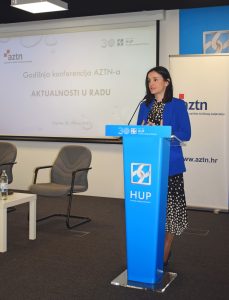
The state secretary of the Ministry of the Economy and Sustainable Development, Hrvoje Bujanović, emphasized the exceptionally good cooperation between the ministry and the CCA. He said that mutual assistance and cooperation between these two bodies took place in joint participation in training programs, various working groups and in other areas of common interest, such as the digital agenda and the digital markets. The Ministry of the Economy, as the sponsor of legal proposals in the area of competition, in close cooperation with the CCA, ensured the adoption of new regulations and necessary revisions of the existing ones in compliance with the EU acquis.
Speaking about unfair trading practices in the food supply chain, the president of the parliamentary committee for agriculture, Marijana Petir, noted that these practices greatly affected the sensitive position of the producers, who were often left with their hands tied in the fight against the big ones that used their significant negotiating power and took advantage of unclearly written clauses. She also noted that the CCA resources had to be urgently strengthened.
The president of the parliamentary committee for the economy, Žarko Tušek, noted that the CCA was responsible for its work to the Croatian Parliament and reported to the parliament about its work every year through an exhaustive annual report. He acclaimed the cooperation of these two bodies and pointed out the understaffed CCA that in spite of it managed to solve demanding cases in both its jurisdictions.
Milka Kosanović, director of membership affairs in HUP, who was also a co-organizer of this conference, highlighted the excellent cooperation between the CCA and HUP in holding training sessions for HUP employees, as well as for its members-undertakings.
The dean of the Faculty of Law, University of Zagreb, prof. Ph.D. Ivan Koprić thanked the CCA for organizing such expert gatherings, where news about competition was spread to the academic community, lawyers, and the judiciary, and expressed his wish to strengthen the cooperation between these two institutions.
After the welcoming speeches, there was a panel entitled “Settlements in prohibited agreements – a new instrument of the CCA and their relationship with leniency programs” moderated by Prof. Ph.D. Siniša Petrović from the Faculty of Law, University of Zagreb, with the panellists Vesna Patrlj, LLM deputy president of the Competition Council, Linda Križić, head of legal affairs in Heineken Hrvatska d.o.o. and Igor Mucalo, attorney at law in Mucalo Law Office.
Settlements in cartel cases represent a new, significant instrument in the enforcement of competition rules in the CCA practice. At a certain point in the procedure, the undertakings can present a written submission where the party to the proceeding voluntarily and in whole admits to the participation in an infringement of Article 8 of the Competition Act and/or Article 101 TFEU and presents in writing its acknowledgement of, or its renunciation to dispute against the decision of the CCA identifying the infringement. The fine can be reduced by 10 % to 20 % of the total amount of the fine that would otherwise be imposed on the party concerned without the settlement submission. This contributes to efficiency of the proceeding and enables the CCA to direct its resources to other or new cases. The panel discussion opened the question of further regulation of certain open legal issues in the application of the new instrument in the form of necessary guidelines for undertakings.
The second panel dealt with the implementation of the Act on the prohibition of unfair trading practices in the business-to-business food supply chain (UTPs Act) from its entry into force until today. The panel discussion was moderated by Sandra Mikinac, MEcon, head of the CCA Unfair Trading Practices Legal Issues Department, Unfair Trading Practices Division, and the participation of the panellists: Miljenko Rakić, head of the Plant Production Sector and Market from the Ministry of Agriculture, Milka Kosanović, LLM, director of membership affairs of the Croatian Employers’ Association (HUP) and Vlatka Vrkić, MEcon, head of the CCA Unfair Trading Practices Economic Issues Department, Unfair Trading Practices Division. They discussed the challenges in the adoption and application of the UTPs Act, most common unfair trading practices at the very beginning of the application of the UTPs Act and now, five years later, the revisions of the UTPs Act, the most frequent questions raised by undertakings and examples from the practice of the CCA. The panellists emphasized the importance of the balance between the requirements of the producers/traders and the suppliers in the enforcement and the need for continuous explanations that should be provided by the CCA and the Ministry of Agriculture. A possible expansion of the list of unfair trading practices was also discussed.
The conference was attended by many experts, representatives from undertakings, academia, attorney offices and judiciary who used this opportunity to exchange experience and their views on the subject.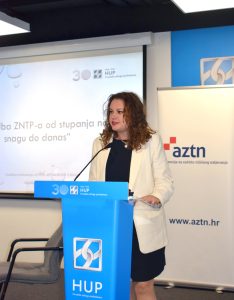

CCA Annual Conference
